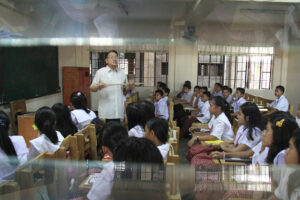
Marcos favors return to old school calendar as PHL battles heatwave
THE PHILIPPINES will go back to its old academic calendar next year after a heatwave brought by El Niño disrupted classes this year.
President Ferdinand R. Marcos, Jr. on Monday said he had asked his Education secretary to come up with a “concrete plan” for the transition.
“Everyday, you turn on the news [and] face-to-face classes are canceled, face-to-face classes have been postponed, etc.,” he told reporters. “So it’s really needed, highly needed,” he said of the plan.
“I don’t see any objections really from anyone, especially with the El Niño being what it is,” Mr. Marcos said. “That’s part of the plan, that we’re trying to do to bring it back to the old schedule. I think it would be better for the kids. Hopefully by next year, it will be completed.”
The Philippines used to start the school year for public schools in June but postponed it to August starting in 2022 amid a coronavirus pandemic and to prevent heavy rains and typhoons from disrupting classes.
The Education department had to suspend face-to-face classes this year for many public and private schools amid record-high temperatures.
It has since given school heads the power to decide when to switch to remote learning “in cases of extreme heat and other calamities.”
On Monday, the House of Representatives passed a resolution urging the Education department to revert to the old calendar.
The upcoming school year starts in July 2024 and ends in May 2025. The current school year ends on May 31.
The Department of Education (DepEd) in February said schools would gradually transition to the old academic calendar, when classes ran from June to as late as May.
The agency said last week it had suggested a “more aggressive alternative” to end the school year 2024 to 2025 by March next year.
Party-list Rep. France L. Castro welcomed the President’s decision but said it might be too late to recover learning losses.
“Malacañang and DepEd should have listened to the calls of students and teachers,” she said in a text message.
The lawmaker said the government should consult education stakeholders about the transition to the old calendar to address issues including overtime pay for teachers.
As of April, more than 7,000 out of 47,678 schools nationwide had shifted to remote learning due to extreme heat.
The Philippines has been struggling with the effects of El Niño, which had caused P5.9 billion in farm damage as of April 30.
The country’s weather bureau on Monday was expecting heat indexes above 42ºC in 30 areas.
The Philippines was among the last countries to reopen schools after a coronavirus pandemic, and the United Nations Children’s Fund last month said unpreparedness in the face of changing climate threatens the learning recovery efforts.
In 2021, the National Economic and Development Authority said the education sector could lose P11.025 trillion in the next four decades due to the long-term impacts of the pandemic. — Kyle Aristophere T. Atienza



